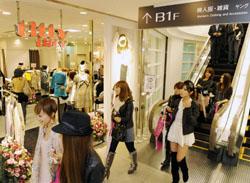 Once upon a time, department stores were magnets for shoppers hungry for fashion and big-ticket luxury brand goods.
Once upon a time, department stores were magnets for shoppers hungry for fashion and big-ticket luxury brand goods.
No longer. During the past decade of economic uncertainty, department stores have struggled with falling sales while easily accessible retail chains offering trendy clothing on the cheap have flourished.
"I used to go to department stores almost once a week, but now I only go about once a month," said a 31-year-old woman who gave only her last name, Otsuki, while shopping in Tokyo's Ginza district on a recent afternoon.
"Recently I've been going to shopping malls outside central (Tokyo) . . . they have my favorite brands and more reasonably priced products," she said. "Even when I go to a department store, I only shop in the basement food section and don't really go to the upper floors."
That in a nutshell shows the difficulties department stores are facing.
According to the Japan Department Stores Association, the industry's annual sales peaked in 1991 at ¥9.7 trillion. They have fallen continuously for the last 12 years and the 2009 figure is expected to fall to less than ¥7 trillion — a level not seen in 24 years.
The association's statistics show that while sales of food haven't changed much, those for clothing and items for the home have dropped sharply in recent years.
In addition to the economic downturn, the industry is contending with a radical shift in the way people shop, including the rise of online shopping and the proliferation of big shopping malls and commercial complexes at train stations.
People in the industry say major department stores have been slow to keep up with trends and need to strengthen their marketing strategies to quickly respond to consumer needs.
In the face of falling revenues, rival department stores have found themselves merging, something unimaginable not so long ago.
In September 2007, J Front Retailing Co. was established when Daimaru Inc. and Matsuzakaya Holdings Co., both of which trace their roots back more than 200 years, decided to merge. In 2008, big names Mitsukoshi Ltd. and Isetan Co. joined hands and established Mitsukoshi Isetan Holdings Ltd., the country's biggest department store chain, with sales of ¥1.4 trillion that year.
But the mergers haven't been a panacea. In October, J Front Retailing President CEO Tsutomu Okuda gave voice to the industry's sense of crisis while reporting the firm's midterm results.
Sales are "worse than ever," he said. "Our stores are losing attractiveness. From service to products, we must create stores that attract customers."
Industry watchers say online retailers and suburban malls are becoming more formidable competitors to department stores.
Seichi Iioka, senior managing director of JDSA, a former executive at Takashimaya Co. Ltd., noted that 30 or 40 years ago there were fewer stores to choose from, and department stores offered a wide range of items.
"The competitive condition has changed a lot," Iioka said in an interview with The Japan Times.
The rise of chains offering low-priced casual wear, including Uniqlo and Sweden's H&M, has intensified the competition, giving customers more choices in a deflation-plagued economy.
Because carrying high-end items is an important feature of department stores, times are very trying, Iioka said.
"Promoting low-priced products in a visible way is tough for department stores," he said.
The Ministry of Economy, Trade and Industry said online retailers rang up sales of ¥6.1 trillion in 2008, an increase of 13.9 percent over the previous year.
Department stores have begun waking up to the threat posed by these new retailers and are trying to respond.
Seibu department stores, for example, started selling the 7 Premium private-label food products of its parent company, Seven & I Holdings Co., last February.
Hiroyuki Hanamitsu, a Seven & I Holdings spokesman, said 7 Premium products account for about 30 percent of the general groceries sold at other department stores, and the company aims to attract shoppers for their daily food needs.
Okuda of J Front Retailing said department stores need to come up with a new business model and stressed the need to offer customers more choices, including reasonably priced products.
His company opened Daimaru Shinsaibashi branch's north building in Osaka in November and is trying to present a new style of store.
The building's first and second basement floors are aimed at young customers, boasting Esperanza and Free's Mart outlets, both of which are popular with young women and feature reasonable prices. These shops never had space in department stores before.
A Daimaru representative said the new approach has been successful and the store is expected to reach its sales target of ¥9 billion for this fiscal year.
This store also has significantly fewer staff compared with other department stores.
High operating costs are another reason business has been tough for department stores. According to Iioka, personnel costs amount to about 10 percent of sales while the figure for general merchandise stores is probably about 5 percent.
Department stores have slashed payrolls in the past few years and are trying to improve efficiency, but customers are still keeping a tight grip on their purse strings.
Tokyo resident Kayoko Kubo, 66, said she goes to a department store about once a week to buy groceries. As she was exiting a store in Ginza, she said that although department stores have a good selection of fresh food, she rarely shops for clothes there.
Instead, she goes to stores like Uniqlo and Muji.
Despite critical remarks by consumers, Iioka stressed that department stores will be able to overcome these challenges, saying that since the mid-1800s they have thrived by adapting to social changes.
While offering more variety and low-priced products helps, "it is fundamental to research customers' needs. People in the industry must make earnest efforts in that direction," he said.





